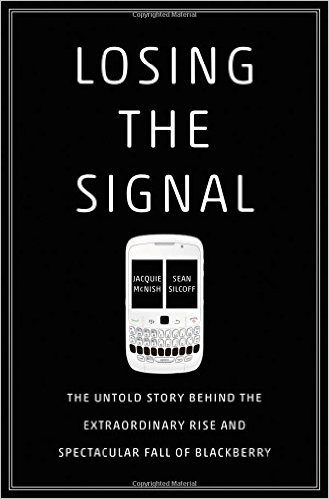
Short-listed for the 2015 Financial Times and McKinsey Business Book of the Year
A Wall Street Journal Best Business Book of 2015
A Best Business Book of the Year, Forbes Magazine
A Times of London Book of the Week
Best Narrative Business Book of 2015 by Strategy+Business
In 2009, BlackBerry controlled half of the smartphone market. Today that number is less than one percent. What went so wrong?
Losing the Signal is a riveting story of a company that toppled global giants before succumbing to the ruthlessly competitive forces of Silicon Valley. This is not a conventional tale of modern business failure by fraud and greed. The rise and fall of BlackBerry reveals the dangerous speed at which innovators race along the information superhighway.
With unprecedented access to key players, senior executives, directors and competitors, Losing the Signal unveils the remarkable rise of a company that started above a bagel store in Ontario. At the heart of the story is an unlikely partnership between a visionary engineer, Mike Lazaridis, and an abrasive Harvard Business school grad, Jim Balsillie. Together, they engineered a pioneering pocket email device that became the tool of choice for presidents and CEOs. The partnership enjoyed only a brief moment on top of the world, however. At the very moment BlackBerry was ranked the world's fastest growing company internal feuds and chaotic growth crippled the company as it faced its gravest test: Apple and Google's entry in to mobile phones.
Expertly told by acclaimed journalists, Jacquie McNish and Sean Silcoff, this is an entertaining, whirlwind narrative that goes behind the scenes to reveal one of the most compelling business stories of the new century.
网友对Losing the Signal: The Untold Story Behind the Extraordinary Rise and Spectacular Fall of BlackBerry的评论
包装简单,但书没有损坏,可以简单了解到其他品牌的故事,推荐。
The rise and fall of RIM.
RIM rode technology disruption and created a company with $20 billion/year in revenue only to see it disappear by being disrupted themselves.
Lots of lessons here.
1) Even though the CEOs were reading the "Innovators Dilemma" they still had little perspective on how rapid disruption would happen to them. And even less of an understanding what to do about it. (The attempt to integrate the QNX software into existing products is a cautionary tale of technical debt, refactoring and plain bad engineering management.) The iPhone in 2007 should have been a wake-up call to both CEOs. Yet they both fell prey to the classic "disruption always looks like a toy to the incumbents" mistake.
2) The company grew past the management skills of the founders. The insular nature of the founders, the Canadian entrepreneurial ecosystem, founder hubris and a feckless board ended any potential of a positive intervention. It took a complete meltdown to get the board to act.
3) Mike Lazaridis, the technical CEO, fell prey to the "shiny object" syndrome. He discovered new technology (QNX) that he thought obsoleted the current software that drove the Blackberry handsets (Java). But instead of figuring out how to finesse the transition, he literally abandoned the existing development team (and revenue). A great example of how not to manage a technology transition.
3) Dealing with major platform disruption usually takes radical structural changes, not new product features. The story unfolds as a slow motion car crash as the CEOs waited, way, way too long to recognize, let alone deal with it. There's a reason that turnaround CEO's downsize companies and focus on what's important. If you're the founder it's almost impossible to get rid of your favorite projects.
Only quibble others have noted. The book barely mentions the changes Heins made, and almost nothing about Chens strategy.
A great business book.
I didn't realize the amount of ingenuity and innovation that came from Blackberry. Their story is very often overlooked when considering Google or Apple with respect to design thinking/innovation, but after reading this it is very clear that Blackberry began the archetype of innovator/technical & savvy business/marketing duo that seems to work in the tech space as well as some really innovative products based on design thinking and user experience (before this was really a buzz word in the space). Although they ultimately were "beat" by the Google's and Apples, the story is fascinating to read.
What a well written book!!
So much research and details: it's just amazing. I'm a HUGE BlackBerry fan: at the early stages of this book I was swelled with pride at what BlackBerry had accomplished (I really didn't know they were THAT powerful) and then you kind of lose a bit of respect to the founders when you see how they handled situations. But I digress, or maybe not, the book is so well written that it makes you feel everything going on.
Moreover, beyond BlackBerry, it helps you understand the mobile world and why it is what it is today.
It's one of the very enlightening books I've read lately.
Great book. I always enjoy books that reveal the behind the scenes stories of companies, especially ones that I am a big fan of... I was one of the original adopters of Blackberry and loved it. Right up to the point that internet access became crucial to my work. Then like so many others, I moved to the iPhone. This is a great read!
喜欢Losing the Signal: The Untold Story Behind the Extraordinary Rise and Spectacular Fall of BlackBerry请与您的朋友分享,由于版权原因,读书人网不提供图书下载服务